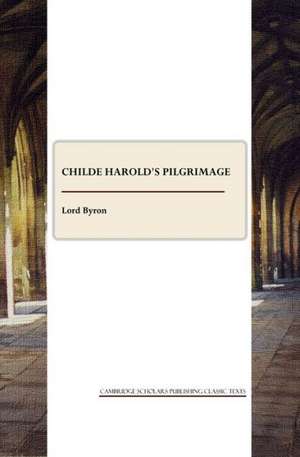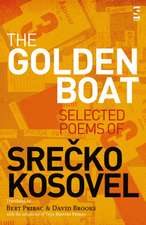Childe Harold's Pilgrimage: Cambridge Scholars Publishing Classics Texts
Autor Lord George Gordon Byronen Limba Engleză Paperback – 30 iun 2009
| Toate formatele și edițiile | Preț | Express |
|---|---|---|
| Paperback (6) | 48.68 lei 3-5 săpt. | |
| CREATESPACE – | 48.68 lei 3-5 săpt. | |
| CREATESPACE – | 51.54 lei 3-5 săpt. | |
| CreateSpace Independent Publishing Platform – | 55.19 lei 3-5 săpt. | |
| – | 77.01 lei 3-5 săpt. | |
| Echo Library – 31 mai 2006 | 98.14 lei 39-44 zile | |
| LIGHTNING SOURCE INC – 26 mai 2018 | 113.05 lei 18-23 zile | |
| Hardback (1) | 179.28 lei 39-44 zile | |
| Echo Library – 31 dec 2006 | 179.28 lei 39-44 zile |
Din seria Cambridge Scholars Publishing Classics Texts
-
 Preț: 165.49 lei
Preț: 165.49 lei -
 Preț: 46.82 lei
Preț: 46.82 lei -
 Preț: 108.66 lei
Preț: 108.66 lei -
 Preț: 109.81 lei
Preț: 109.81 lei -
 Preț: 167.40 lei
Preț: 167.40 lei -
 Preț: 84.30 lei
Preț: 84.30 lei -
 Preț: 99.05 lei
Preț: 99.05 lei -
 Preț: 75.99 lei
Preț: 75.99 lei -
 Preț: 135.93 lei
Preț: 135.93 lei -
 Preț: 137.88 lei
Preț: 137.88 lei -
 Preț: 86.69 lei
Preț: 86.69 lei -
 Preț: 66.89 lei
Preț: 66.89 lei -
 Preț: 150.10 lei
Preț: 150.10 lei -
 Preț: 84.00 lei
Preț: 84.00 lei -
 Preț: 162.61 lei
Preț: 162.61 lei -
 Preț: 158.75 lei
Preț: 158.75 lei -
 Preț: 64.97 lei
Preț: 64.97 lei -
 Preț: 82.09 lei
Preț: 82.09 lei -
 Preț: 126.98 lei
Preț: 126.98 lei -
 Preț: 80.29 lei
Preț: 80.29 lei -
 Preț: 84.00 lei
Preț: 84.00 lei -
 Preț: 96.83 lei
Preț: 96.83 lei -
 Preț: 70.50 lei
Preț: 70.50 lei -
 Preț: 91.72 lei
Preț: 91.72 lei -
 Preț: 143.36 lei
Preț: 143.36 lei -
 Preț: 94.68 lei
Preț: 94.68 lei -
 Preț: 77.97 lei
Preț: 77.97 lei -
 Preț: 135.64 lei
Preț: 135.64 lei -
 Preț: 90.85 lei
Preț: 90.85 lei -
 Preț: 95.84 lei
Preț: 95.84 lei -
 Preț: 144.32 lei
Preț: 144.32 lei -
 Preț: 103.57 lei
Preț: 103.57 lei -
 Preț: 58.42 lei
Preț: 58.42 lei -
 Preț: 112.35 lei
Preț: 112.35 lei -
 Preț: 98.46 lei
Preț: 98.46 lei
Preț: 66.78 lei
Nou
Puncte Express: 100
Preț estimativ în valută:
12.78€ • 13.66$ • 10.65£
12.78€ • 13.66$ • 10.65£
Carte indisponibilă temporar
Doresc să fiu notificat când acest titlu va fi disponibil:
Se trimite...
Preluare comenzi: 021 569.72.76
Specificații
ISBN-13: 9781443809665
ISBN-10: 1443809667
Pagini: 290
Dimensiuni: 145 x 203 x 18 mm
Greutate: 0.4 kg
Editura: Cambridge Scholars Publishing
Seria Cambridge Scholars Publishing Classics Texts
ISBN-10: 1443809667
Pagini: 290
Dimensiuni: 145 x 203 x 18 mm
Greutate: 0.4 kg
Editura: Cambridge Scholars Publishing
Seria Cambridge Scholars Publishing Classics Texts
Notă biografică
George Gordon, afterwards Lord Byron, was born in London in 1788. He inherited the title and seat at Newstead Abbey, but little money, in 1798. His first poems were written at Harrow before he proceeded to Trinity College, Cambridge, acquiring a reputation for high living. He published two volumes, Fugitive Pieces and Hours of Idleness, in 1807, but they attracted criticism. After a Mediterranean tour, Byron completed the first two cantos of Childe Harold's Pilgrimage, which made him a celebrity on publication in 1812. Further poems were successful but the end of his brief and unsuitable marriage in 1816 led to scandal and Byron left England never to return. He went to Switzerland with Percy and Mary Shelley, then to Venice, where he completed Childe Harold, wrote Manfred and started Don Juan. He also corresponded with Goethe and became involved in the cause of Italian independence as his fame grew. Moving around the Mediterranean in 1822 he became actively involved in the movement for Greek independence from Turkey, becoming one of its political and naval leaders. He contracted rheumatic fever from a severe chill in an open boat, and died in April 1824. His heart was buried in Greece, his body at Newstead after Westminster Abbey refused it.







